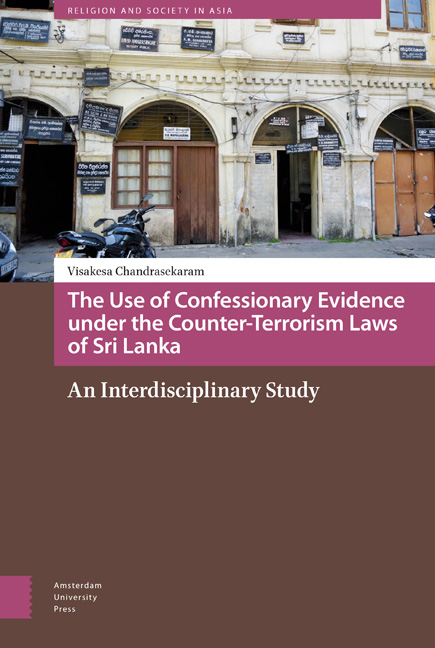 Use of Confessionary Evidence under the Counter-Terrorism Laws of Sri Lanka
Use of Confessionary Evidence under the Counter-Terrorism Laws of Sri Lanka Book contents
- Frontmatter
- Dedication
- Contents
- 1 Do Tigers Confess?
- 2 Rebellion and Martyrdom
- 3 Facts, Falsities, and Fictions
- 4 Punitive Interrogation of Tamil Tiger Suspects
- 5 Judgement of the Terrorist Against the ‘Formula of Justice’
- 6 Fantasies, Fictions, Myths, and Denials about Tamil Tigers’ Confessions
- Appendix
- Acronyms
- Acknowledgements
- About the author
- Bibliography
- Index
4 - Punitive Interrogation of Tamil Tiger Suspects
Published online by Cambridge University Press: 10 December 2020
- Frontmatter
- Dedication
- Contents
- 1 Do Tigers Confess?
- 2 Rebellion and Martyrdom
- 3 Facts, Falsities, and Fictions
- 4 Punitive Interrogation of Tamil Tiger Suspects
- 5 Judgement of the Terrorist Against the ‘Formula of Justice’
- 6 Fantasies, Fictions, Myths, and Denials about Tamil Tigers’ Confessions
- Appendix
- Acronyms
- Acknowledgements
- About the author
- Bibliography
- Index
Summary
By demonstrating in the previous chapter that the written texts within the majority of Tamil Tigers’ confessions are incompatible with the polysemic criteria (legal, semantic, and semiotic) that determine truth, it was argued that these confessions were not given voluntarily – the most important element for a confession to be legally admissible. It was also suggested that these confessions likely resulted from the police exerting physical or psychological pressure on the suspects. This chapter aims to verify these claims, and thereby to assess the validity of the confessions of Tamil Tigers by questioning the efficacy of the policing strategies adopted in arresting, investigating, and prosecuting terrorist suspects. This exercise involves an analysis of the responses of the terrorist suspects who have been subjected to such policing strategies. The chapter will therefore present the voice of the suspect, or the defence, as opposed to the voice of the police, posing the questions: How have the state's agents enforced the counter-terrorism measures among the suspect population, and how do such measures impact on individual suspects? Exploring the answers to these questions requires an analysis of the materials that reveal both Sri Lankan and international experiences of policing, particularly in the counter-terrorism context, while drawing attention to the defence of the Tiger suspects. Hence, the methodology will include: (a) referring to the literature on policing, the state of emergency and penalty; (b) presenting and analysing documentary evidence such as confessions, medical reports, witness statements and news articles; and (c) presenting materials gathered during the field interviews and field observations. This discussion will be linked to the analysis in the first chapter of the background of the war against terrorism in the context of the ‘state of exception’, ethnic rivalry and penal theory. Considering these broader contexts, this chapter explores how the police have defined the suspect population in Sri Lanka, the types of interrogation strategies they have applied in their investigations, how far the suspects were able to exercise their liberty in police custody, and how the political and ethnic factors have influenced such investigations.
- Type
- Chapter
- Information
- Use of Confessionary Evidence under the Counter-Terrorism Laws of Sri LankaAn Interdisciplinary Study, pp. 115 - 144Publisher: Amsterdam University PressPrint publication year: 2017


